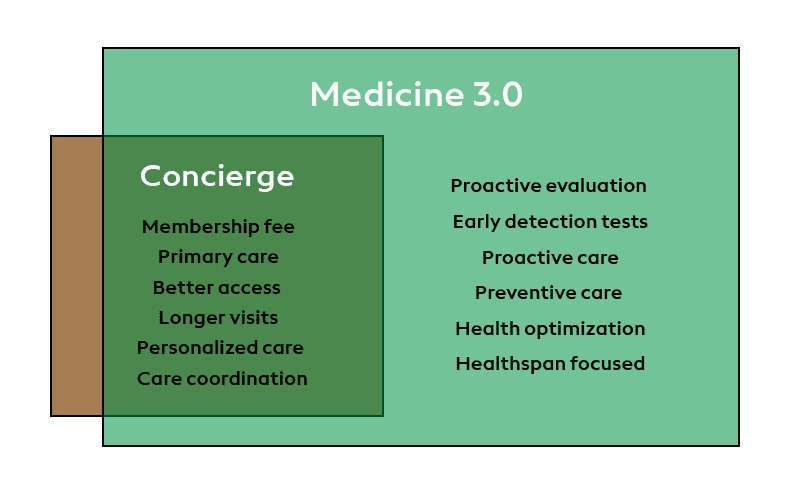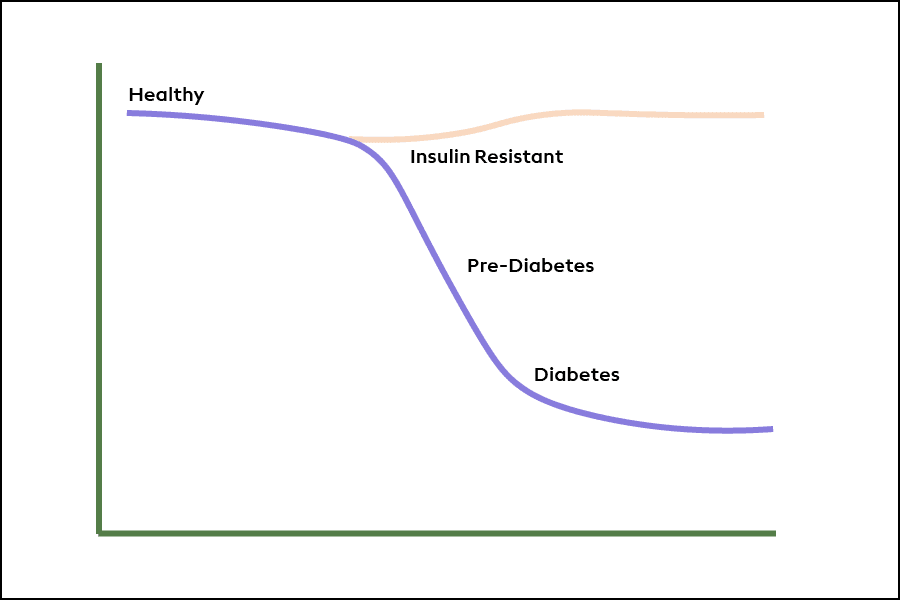This is one of the most common questions we receive from people reaching out to inquire about Paradigm Health and schedule their initial consultation. The question is timely as people are looking for better ways to access healthcare and discovering that even brief encounters can be ridiculously expensive for what is provided. The question is relevant as new models of care are being created in response to poor access and decreasing value. This gets to the philosophical core of Paradigm Health as a unique medical practice, so we’ll take a few moments generalizing on the overlapping but different approaches to healthcare delivery that Concierge Medicine and Medicine 3.0 (Paradigm Health) attempt to deliver.
Concierge Medicine
Concierge medicine focuses on providing access to personalized, high-quality care for a limited number of patients. Patients pay an annual retainer or membership fee in exchange for enhanced access to a primary care physician. They have longer appointment times, same-day or next-day appointments, 24/7 access via phone or email, and more one-on-one attention. Services may include primary care and care coordination, but rarely include extensive preventive care. Typically nothing else is offered as part of this fee (e.g. labs, tests, procedures, etc.). Concierge medicine is becoming more and more common in many areas because the time and care that patients and physicians desire in order to provide higher quality healthcare, is at odds with what large healthcare systems as a whole desire (higher patient volumes per physician).
Medicine 3.0

In Medicine 3.0 the focus is on a proactive, data-driven, and personalized approach to healthcare, leveraging the latest advances in technology and medical knowledge. This approach is firmly built upon the scientific method like modern medicine (Medicine 2.0), but it advances well beyond modern medicine in its proactive and preventive, rather than reactive, approach. Medicine 3.0 physicians incorporate some of the same elements that concierge practitioners provide, such as improved access and personalized care, but go further by including advanced diagnostic tests and screening methods like genomics, physical fitness analyses, and continuous tracking of health metrics. A focus of Medicine 3.0 physicians is on preventing disease and optimizing health so that patients can maintain their ability to be functional and independent as they age. This isn’t to say that concierge medicine practitioners do not also do some of these, but in Medicine 3.0 this is the primary approach.
Through a combination of lifestyle interventions, strength and fitness training, nutrition, supplements, medications, and other therapies tailored to individual patients, physicians practicing Medicine 3.0 aim to treat the root causes of disease, rather than just managing symptoms. The focus is on optimizing healthspan and longevity (living healthier longer) rather than just treating disease after it develops (living longer while sick). Medicine 3.0 represents a newer and evolving approach to healthcare, and its full adoption in a medical practice is quite rare.
To give one clinical example, you may be familiar with the terms ‘diabetes’ and ‘pre-diabetes.’ The pancreas produces insulin to control the level of glucose that is circulating in your blood. In pre-diabetes, the body is beginning to become resistant to insulin and it is becoming harder and harder to keep blood glucose levels under control. In diabetes, the body is unable to keep up any longer and fails to control glucose levels. This results in damage to organs by high glucose levels.
Three critical points:
- For most people, going from healthy to prediabetic and then to having diabetes happens over years
- Consistently elevated blood glucose damages your blood vessels, kidneys, nerves, eyes, and heart – in fact, almost no part of your body is spared from problems related to high blood glucose
- It is possible to detect early if someone is becoming insulin resistant, which happens even before you fall into the category of ‘prediabetic’; and it is highly likely that insulin resistance can be reversed or at least greatly reduced.

Modern medicine typically waits for someone to develop diabetes before offering much in the way of treatment. A person is not commonly offered preventive education or proactive engagement to avoid becoming diabetic. But, once a person already has diabetes, then it is recommended that they be treated to control glucose levels. Even then, normal glucose levels are not recommended because it is no longer safe to try for that and risk being too low. (The typical goal for patients with diabetes is an A1c of 7, which corresponds to an average blood glucose of 154 mg/dL, much higher than the upper end of the normal range at 114 mg/dL)
A Medicine 3.0 approach would spend the small upfront cost to know how well a person’s body handles sugar (are they insulin resistant, pre-diabetic, etc.). If they are healthy, then a plan to stay healthy is started. If a person is insulin resistant, then a plan to reverse that condition, become healthy, and avoid becoming diabetic is begun. If a person has diabetes, then a plan is started to control the disease, prevent organ damage and worsened disease, and maximize the body’s ability to stay functional. The goal every time, is to attack the underlying problem and help people avoid all the complications, loss of health, and expense that can come from having diabetes.
Health Asset Management
We are encouraged by the positive popular movement by forward-thinking, informed patients who want proactive healthcare, not just reactive disease treatment and the pills and bills that go along with it. Naturally, investing earlier in health can pay dividends in lifespan and healthspan. We have built this into a system at Paradigm Health called Health Asset ManagementTM
To summarize, while both Concierge Medicine and Medicine 3.0 share the goal of providing a personalized approach with more time per patient, Medicine 3.0 advances well beyond the typical model of Concierge Medicine with its proactive, preventive focus.
At Paradigm Health we don’t just wait around for disease, and we don’t only treat disease after it happens. It is our mission “to achieve health optimization for our patients by creating a caring, respectful, and safe community where our teams apply the latest research and technology with an open mind in a practice that is efficient, adaptable, and flexible to the patient’s ongoing healthcare needs.”
Medicine 3.0 is where modern healthcare is at its best – and it is our goal every day to deliver this to our patients.
For your health,
Matt and David





